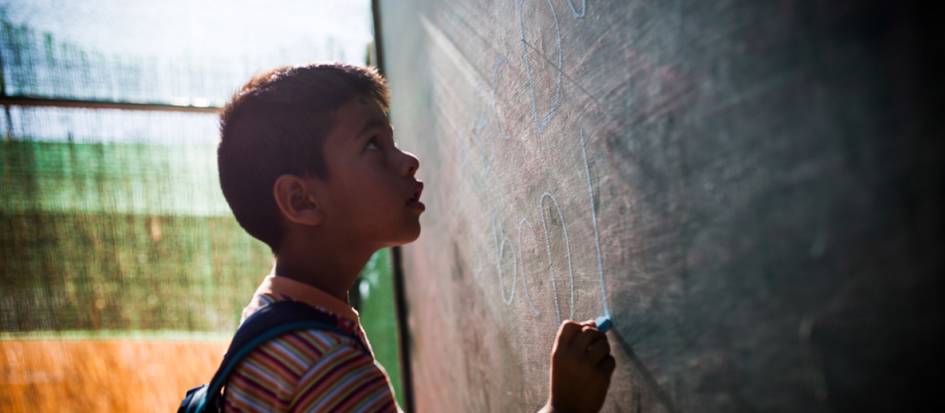
Education in situations of conflict and crisis is central in efforts to protect children and youth in the near-term and fostering peaceful coexistence over the longer-term. But how can education enable individuals and communities to build durable futures when there is great uncertainty about where these futures will be?
In the new video "An Agent of Change", PRIO research combines with animation and story writing from PositiveNegatives to convey the narratives of refugee students and teachers in the Dadaab refugee camps of Kenya. The animation aims to tell the stories of real people whose experiences have been combined, anonymized, and now re-told to reach a larger audience.
The script for the animation was written by Hanna Ali, a British-Somali writer who is the artistic director of Kayd Somali Arts & Culture in London. The story was then visualized by Victor Ndula, a Kenyan artist who had spent time in the camps working on arts projects with youth and animated by Diana Garcia. Throughout the process, several rounds of feedback by the researchers and stakeholders in refugee education were provided.
The music heard throughout the video illustrates the collaborative process of the project: Somali singer Aar Maanta kindly allowed the team to use a recording of an informal jam session in Oslo with local musician Ali Osman when they were invited to PRIO in February 2019 for a seminar by PRIO's Centre on Culture and Violent Conflict.
The story was created based on research by Hassan Aden. Aden is a doctoral researcher at PRIO, and a PhD student at Gothenburg University. He has long-term knowledge of education in Dadaab, having taken his primary and secondary education there and working as a teacher for several years, before moving to Sweden, where his academic career took off. Aden's work focuses on how education can build durable futures, and the challenges refugees often face when seeking and using educational opportunities.
Aden explains: "We used animation to simplify complex ideas about refugee youths' aspirations in education while shedding light on the multitudes of challenges affecting their learning. Furthermore, we wanted to reach as many people as possible, and influence donor communities to improve support for education of refugee young people in Dadaab camps. At present, education in Dadaab is in a deep quality crisis due to declining donor funding. Students suffer from inadequate learning resources, overcrowded classes, and limited numbers of trained teachers. All these cumulatively affect their capability, motivation to learn, performance in exams, and the potential of achieving valued educational goals".
Ali and Aden discussed their collaboration on an episode of PRIO's Peace in a Pod which you can listen to now on all podcasting apps.
Aden's PhD is part of the larger project "Refugee Education: Building Durable Futures (REBuilD)", led by Research Professor Cindy Horst and funded by the Research Council of Norway. Horst and Aden argue for the need to understand refugee education as a long-term investment, and to pay greater attention to the initiatives that educated refugees themselves engage in to offer the next generation access to quality education. This refugee-led education is often better at taking into account the understandings of the community as to what responsible future citizens would need to learn.
The project team's research in the Dadaab refugee camps of Kenya illustrates the important role of refugee-led initiatives. "Such initiatives are quite invisible in current academic and policy debates," says Aden. "In Dadaab, refugee-managed schools offer accredited private primary and secondary education for an increasingly large number of students. At primary level, the Integrated Academies offer the regular Kenyan curriculum as well as Islamic religious education. Operating with qualified and well-paid teachers – refugees and nationals – these schools produce the best-performing students not only in Dadaab, but across North-Eastern Province, where the camps are situated."
Formal public refugee education in Kenya is currently funded by international donors and implemented by a coalition of the host government, UNHCR and INGOs – by and large within short-term planning cycles. And yet, the Dadaab camps have existed for thirty years. It takes an average of 12 years to educate a child up to secondary school level. As such, long-term investments are needed.
Such investments should focus on refugees themselves as providers and not just receivers of education. This demands that we see refugees as assets and invest in their human capital, rather than as victims and burdens who require aid implemented by others. The longer refugees are denied opportunities to learn and work, the wider the gap created by violent conflict and exile.
Learn more at prio.org/rebuild.
Read the policy brief "Refugee Education: A Long-Term Investment" here.





